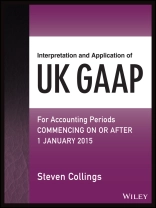Get up to date on the latest UK GAAP, with practical application
guidance
Interpretation and Application of UK GAAP is a
comprehensive, practical guide to applying UK GAAP at all levels,
for accounting periods commencing on or after January 1, 2015. This
book examines all of the core principles for every business, from
subsidiaries of major listed companies right down to the very
small, owner-managed business. Each chapter includes a list of
relevant disclosure requirements to facilitate understanding, and
real-world examples bring theory to life to provide guidance toward
everyday application. Readers gain practical insight into the
preparation of accounts under the EU-adopted IFRS, FRSs 100, 101,
and 102, the FRSSE, and the Companies Act 2006, with expert
guidance as to which requirements apply in which situations, and to
which companies, and the type of disclosure each scenario requires.
The book also includes detailed analysis of the planned changes to
the Small Companies’ Regime which are scheduled to take effect in
2016.
With sweeping changes coming into effect from January
1st 2015, financial statement preparers must have a
sound appreciation of how the new UK GAAP works. This book provides
a complete guide, with the latest regulations and straightforward
advice on usage.
* Understand UK GAAP application at all levels
* Learn how to handle all relevant key accounting treatments
* Refer to complete disclosure requirement lists for each
topic
* Get up to date on the latest area-specific practices
With new accounting practices in many broad areas including
investment property, inventory valuations, deferred tax, fixed
assets, and more, auditors and accountants need an awareness of how
the new financial reporting regime will affect them.
Interpretation and Application of UK GAAP is the most
comprehensive reference, with the latest information and practical
guidance.
Tabla de materias
About the Author vii
Foreword ix
Preface xi
Acknowledgements xiii
Introduction xv
1 General Requirements of the Companies Act 2006 1
2 The Statutory Audit Requirement and Accounting Principles 27
3 The Primary Financial Statements and Disclosure Notes 43
4 Financial Reporting for Smaller Companies 65
5 Summary of the Key Differences between FRS 102 and ‘Old’ UK GAAP 83
6 Consolidated and Separate Financial Statements 103
7 Accounting Policies, Estimates and Errors 125
8 Revenue Recognition 137
9 Assets Held for Sale and Discontinued Operations 153
10 Employee Benefits 159
11 Income Tax 177
12 Intangible Assets 199
13 Property, Plant and Equipment and Investment Properties 213
14 Borrowing Costs 237
15 Impairment of Assets 241
16 Government Grants 261
17 Financial Instruments 267
18 Inventories and Work-in-Progress 299
19 Share-based Payment 309
20 Leases 321
21 Provisions and Contingencies 341
22 Statement of Cash Flows 351
23 Investments in Associates and Joint Ventures 365
24 Related Parties 379
25 Specialised Activities 395
26 Liabilities and Equity 421
27 Events after the Reporting Period 443
28 Foreign Currency Translation 457
29 Small Company Abbreviated Financial Statements 467
30 Reduced Disclosure Framework 485
31 First-Time Adoption of FRS 102 491
Index 505
Sobre el autor
Steven Collings (Bolton, UK) is the Audit & Technical Partner at Leavitt Walmsley Associates, a firm of Chartered Certified Accountants based in Manchester. He writes extensively on technical matters on Accountingweb.co.uk, and is a partner in the student website, studentaccountant.co.uk. He is also a freelance lecturer to student accountants and to qualified AAT members on financial reporting and auditing issues.
Steve is a member of the Wiley Insight: IFRS Editorial Board.












